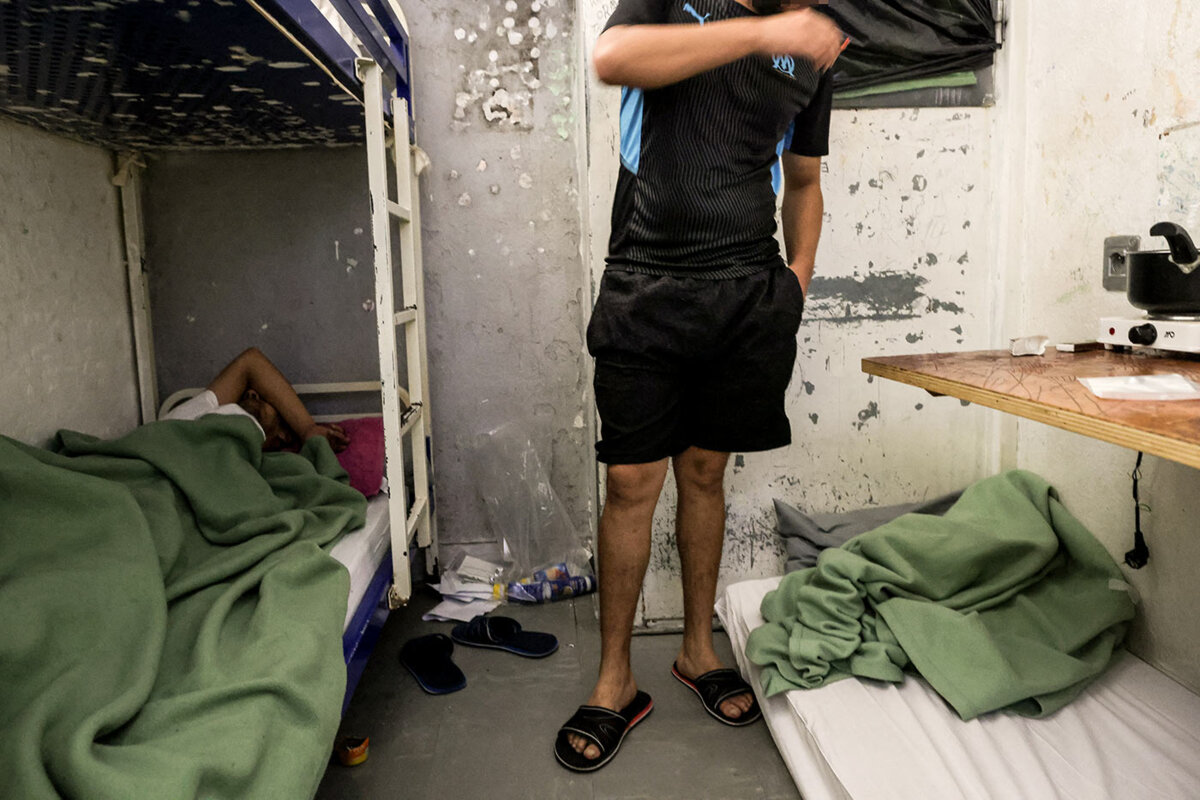France’s prison population has reached a record high, with a total of 72,836 people recorded behind bars on December 1st, a year-on-year rise of 4.1%, according to monthly statistics published earlier this week by the justice ministry.
The report shows overcrowding has mechanically increased across the country’s jails. With a total of 60,698 designated places for prisoners, representing a shortfall of more than 12,000 places, overcrowding runs at an average 120%. There are 2,133 prisoners who now sleep on mattresses laid out on cell floors, representing a year-on-year rise of 34%.
The dire situation, which threatens the safety and health of inmates, comes despite a significant increase over the past year in the numbers of sentences replacing what would have previously been a jail term with the wearing of electronic tags instead.

Enlargement : Illustration 1

A total of 101 prisons (representing a population of 43,721 inmates) are overcrowded well beyond the national average of 120%. Most of these are a category of prison called maisons d’arrêt, which house those held in preventive, pre-trial detention, prisoners serving sentences of less than two years, and those awaiting a place in another prison. Several of these are at more than twice their prisoner capacity, including that in Nîmes, southern France, (212 %); at Carcassonne, in the south-west (210.9 %); in the southern town of Perpignan (207.7%); at Foix, in the south-west (203.1%), and at Bayonne (201.3%), also in the south-west.
Others come close, including the prison in Tours, north-west France, (189.7%); at Béthune, in north-east France, (187%); at Fontenay-le-Comte, in the south-west (184.6%), and at the southern town of Puy-en-Velay.
The problem of overcrowding in French prisons is not new. On January 30th 2020, in a case brought before the European Court of Human Rights by 32 inmates complaining of their prison conditions, the court ruled that France had violated articles of the European Convention on Human Rights and advised that the French government should “consider adopting general measures aimed at eliminating overcrowding and improving material conditions of detention”. The complaint had been brought by prisoners from jails on mainland France, and others held in jails in the French islands of Martinique and Guadeloupe in the Caribbean, and in French Polynesia.
A brief fall in the prison population occurred in the spring of 2020 during the Covid-19 pandemic, when a number were freed early due to the health crisis, and when fewer people were brought before the courts as a result of lockdown measures. In all, the number of prisoners fell by about 13,500 over a period of two months when, and for the first time in a long while, the overall number of prison places exceeded the numbers detained.
It was in that context that, on June 3rd 2020, dozens of associations and organisations representing different professions within the French justice system, along with NGOs working in the fields of social and medical care, and also personalities from the worlds of cinema and culture, addressed an open letter to President Emmanuel Macron exhorting him to seize the occasion to put in place an audacious policy of creating alternatives to prison sentences.
“Over these past twenty years, France has seen a continual growth in imprisonment, which has forced those detained to live without privacy and in demeaning conditions, and has condemned the prison institution to lead a vain search to find a sense to a prison sentence which is above all synonymous with distress, social exclusion and dehumanisation,” they wrote. “The previously unseen fall [editor’s note, in prisoner numbers] that we have just seen reminds us that another path is possible. That a political will, allied to the mobilisation of all the actors of the justice system, allows for the freeing, and maintaining the freedom, of thousands of people without presenting a danger in terms of security.”
That open letter was renewed on June 3rd 2021 by many of those who signed it one year earlier, including the French Human Rights League, the International Prisons Observatory, the Secours Catholique social care charity, the Syndicat de la magistrature French magistrates’ union, and the French lawyers’ union, the Syndicat des avocats de France. But the call went unheeded, and the French government announced a six-year plan for the building of 15,000 new prison places, calculating that the prison population would rise to 80,000 by the year 2027. The signatories of the open letter denounced this as “a costly and ineffective solution”, adding: “The position of France runs counter to the European trend which is characterised by a substantial fall in the prison population over the past ten years.”
In an unprecedented move this month, the controller-general of places of detention, Dominique Simonnot, an independent public official whose responsibilities include acting as a watchdog over prisoners’ rights and conditions, called for the suspension of any further placements of prisoners in the maison d’arrêt prison at Bois-d’Arcy in the south-west suburbs of Paris.
Simonnot’s recommendation, published on December 16th in France’s official gazette of legal and legislative notices, the Journal officiel, followed her visit to the overcrowded prison in September, when she recorded what she described as “disgraceful detention conditions”.
Among the 867 inmates in the prison, which has an official capacity of 530 places, she found that 466 prisoners were kept two at a time in cells designed for one, while 201 prisoners were kept three at a time in cells for one. She slammed a “general disorganisation of detention” which gave no guarantee “neither for the safety of those imprisoned nor for the people who work” in the jail. In his observations of Simmonot’s report, French justice minister Éric Dupond-Moretti agreed that the situation at Bois-d’Arcy was “preoccupying”.
-------------------------
- The original French version of this report can be found here.
English version by Graham Tearse


